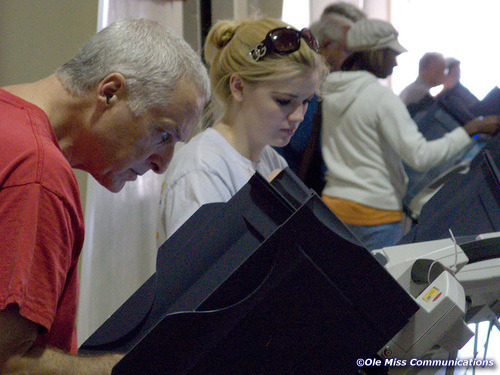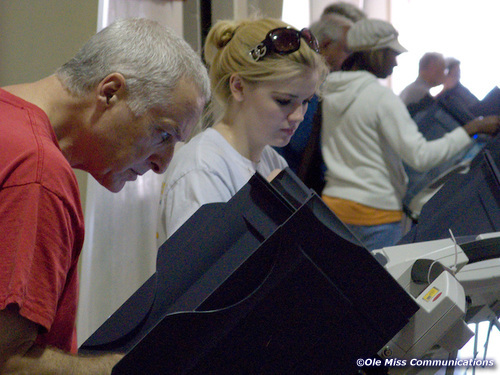
New Post has been published on http://hottytoddy.com/ensuring-integrity-of-the-vote/
Ensuring Integrity of the Vote

I spent my summer representing challengers in a series of election contests. I have written before about some of what we proved. Now, some ideas for ensuring integrity of the vote.
One contest arose in the Republican primary election for a Gulfport City Council seat. There, the two candidates were separated by only two votes, out of 1232 cast. The contest of the result centered on questions surrounding the accuracy of the machine count.
During our physical examination of the ballots (Gulfport and Harrison County use precinct scanners, so every voter completes a paper ballot), our hand count revealed a 616-616 tie. Gulfport’s Republican Municipal Executive Committee, after hearing both candidates’ positions, nonetheless decided to let the machine tally stand.
They decided not to reopen the ballot boxes to count the votes for themselves. By law, the committee was within its discretion. But my client’s only choice was to go to court, for another month or more of draining litigation, or let the result stand. For the good of the city, he chose the latter.
The other two contests arose in a Democratic primary election for a Canton Alderman’s seat, and in the Mayor’s race in Hattiesburg. Those cases both went to trial in July. While Gulfport’s Republican primary was just razor-close, Canton’s and Hattiesburg’s elections were not only close but also marred by serious “irregularities” (that is what the court cases call it; “vote fraud” could also apply).
In all three cases, the integrity of our election process was on trial. In the two court cases, the courts ordered new elections because of the serious departures from Mississippi’s election laws.
Those election laws are at least partly to blame. They are outdated, confusing, and subject to abuse.
Mississippi’s election code was largely written when people marked paper ballots and slid those ballots into a ballot box. Technology, including electronic voting machines, voting by email (as Mississippi’s soldiers, sailors and airmen can do), and a statewide voter database, has outpaced the governing law.
As a result, election officials have often had to adapt what the law says to how voting actually works. The results are inconsistent and unclear to the folks who have to run elections in real time, as voters wait in line.
Our code is a hodgepodge of provisions from a time when Mississippi had only one party, and the Democratic primary determined the winners. That reality has clearly changed, but the law has not kept pace.
The election contest process itself is irrational and inconsistent. There are different procedures for primary election contests (tried before a judge and the county election commission) and general election contests (tried before a jury). Many questions are left unanswered, and the court cases are inconsistent.
Mississippi has no recount provision. If we did, the Gulfport contest might have ended differently, without placing such heavy burden on the candidates. Because we don’t have recounts, the only way to verify accurate results is through a contest.
There are two sets of code sections dealing with absentee ballots, which may be the biggest source of abuse and fraud. The code sections do not always mesh with each other. The Supreme Court has repeatedly called our absentee ballot system “flawed.”
Likewise, the logistics of preparing ballots, safeguarding ballot boxes, and handling paper ballots (like absentee, affidavit, and emergency ballots) are often burdensome to election officials, and costly to the counties that foot the bill. Illegal votes are counted; valid votes are not.
Most voters never see this side of the election process. But it is important. Indeed, as the Supreme Court has said, the “integrity of our government can be no greater than the integrity of elections which put our government officials in office.”
Mississippi’s new voter ID law will help, assuming the Obama Justice Department will stop suing long enough for us to implement it. There are other things that could help, too:
• Limiting the number of absentee ballots any one person can witness or notarize;
• Clarifying voter assistance rules and how many voters one person may assist;
• Handling absentee ballots at the central tabulation location (the courthouse) rather than in each polling place; and
• Insisting that election commissioners clean up county voter rolls.This past Session, the Legislature established a commission to redraft Mississippi’s election code. The commission is drafting now.
It may be hard to get a comprehensive election law approved by legislators. All of them fancy themselves to be experts on election law, since they each won at least one election. While a big task, it is one that needs doing.
– Cory T. Wilson is a Madison attorney with Heidelberg Steinberger Colmer & Burrow, P.A. Follow Cory on Twitter, @CoryWilsonMS, or email cory@corywilson.ms.
via Tumblr http://hottytoddynews.tumblr.com/post/61530837931

No comments:
Post a Comment